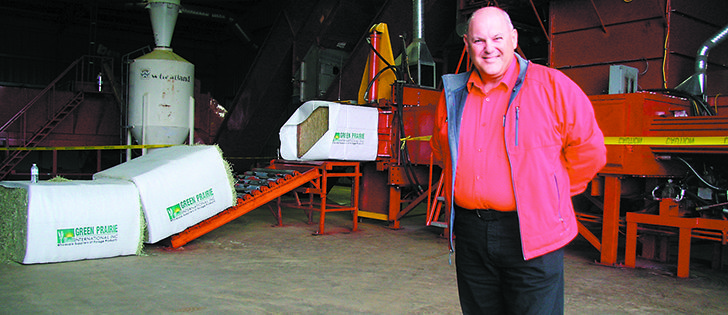Hay dehydration system | Company hopes expansion will entice more alfalfa and timothy hay growers
Canada’s largest exporter of compressed hay is about to get larger.
Green Prairie International Inc. of Lethbridge is adding a hay dehydration system to its operation, which has sold compressed forage to international markets for 25 years.
GPI president John Van Hierden said the expansion will allow hay harvest to start up to three weeks earlier in the spring and remove some of the weather risk for timothy and alfalfa producers who supply the plant.
Hay can be cut one day, allowed to dry to 45 percent moisture and then trucked to the plant for further drying, processing and shipping.
Read Also

Canola oil transloading facility opens
DP World just opened its new canola oil transload facility at the Port of Vancouver. It can ship one million tonnes of the commodity per year.
The new dehydration equipment also includes electrical generation capabilities that will produce enough heat for hay drying while putting the excess back into Alberta’s electrical grid.
GPI shipped 100,000 tonnes of compressed hay last year to markets in Japan, Taiwan, South Korea, Saudi Arabia, Dubai, United Arab Emirates (UAE), China, France and Vietnam.
Van Hierden hopes the expansion will double the export volume, which would require more farmers to grow more acres of timothy and alfalfa.
“We are looking to put a lot more resources and emphasis on development of acres,” he said.
“We need a lot of acres of alfalfa. We need a lot of acres of timothy. We’re going to focus a little more on the contracted acres.”
GPI celebrated its 25th year in business Sept. 7, and Van Hierden said in his speech that the company will need another 40,000 to 50,000 acres of product to keep its new equipment running at capacity and meet its export goals.
The company already has supply agreements with many southern Alberta forage growers, as well as using product from its own farming operation, Cascade Farms. However, Van Hierden said more supply will be needed.
The international market is healthy for compressed hay, particularly for timothy, he added.
“It’s a higher value crop than alfalfa and always will be because there’s only certain areas where they can grow timothy.”
The crop does best with the cool nights and hot days that are found in southern Alberta, where irrigation removes moisture worries.
Van Hierden said many countries are losing irrigated acres as aquifers deplete, so demand for Canadian forage is rising.
For example, the UAE wasn’t a forage market six years ago, when irrigation in that country was more available. Now it imports 1.7 million tonnes per year to meet its livestock feed needs.
All of GPI’s production is exported. It dealt primarily in timothy until 2009, when it added alfalfa.
The 200,000 sq. foot facility east of Lethbridge includes equipment that will mix various percentages of large square bales to meet the specific hay quality and mix desired by customers.
It also offers various compressed bale sizes and grades.
Van Hierden started stacking hay at the age of 17 and branched into shipping hay overseas in containers. One overseas container would initially hold eight tonnes.
Seeing the potential, he and his brother developed hay compression equipment that now allows 26 tonnes per container.
The patented equipment continues to be manufactured at Hunterwood Technologies in Cochrane, Alta.
GPI is also exploring the pet food market potential.
“We have the product and there is a market, so as a business we are just looking to see if we can work our way into that market,” said procurement and logistics manager Chris Whittle.
The company has signed an agreement with a Netherlands company that has equipment suitable for pet food packaging. GPI ships hay to that country, where it is packaged and distributed as pet food.
Van Hierden said he will install similar equipment at the Lethbridge plant if the project proves feasible.
















